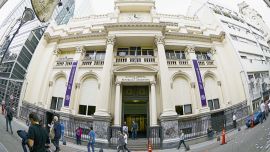Argentina launched an agreement with seven private banks on a repurchase agreement of US$2 billion, money aimed at bolstering the Central Bank’s foreign reserves.
The structure of the transaction includes a floating interest rate of 450 basis points over the US Federal Reserve’s Secured Overnight Financing Rate with the contract maturing in April 2027, the monetary authority said in a statement Wednesday.
Bank of China Ltd, Banco Bilbao Vizcaya Argentaria SA, Citigroup Inc, ICBC Standard Bank Plc, JPMorgan Chase & Co, Banco Santander SA and Standard Chartered Plc are participating in the transaction, according to people familiar with the matter, asking not to be named as the deliberations are private.
Spokespeople from JPMorgan, Citi, BBVA, Standard Chartered and the monetary authority declined to comment. Spokespeople from the other three lenders did not immediately respond to requests seeking comment.
Repurchase agreements are short-term contracts to sell securities and repurchase them later at a slightly higher price. In the US, the Fed uses them to manage the money supply and influence short-term interest rates. In Argentina, past governments have used the funding deals to address capital needs, often involving foreign banks to raise billions of dollars.
The repo, as the transaction’s commonly known, is the country’s second this year, providing funding Argentina needs to meet international reserve requirements as part of a multi-billion dollar staff-level agreement with the International Monetary Fund.
Still, only a portion of the repurchase agreement will count toward the IMF’s reserve targets for the nation, per the fund’s methodology. And per the deal with the Washington-based lender, President Javier Milei’s team needed to have accumulated US$4.4 billion in net reserves between the end of March and mid-June.
The president so far, has refused to purchase dollars via the official currency market, arguing that it’s a strategy that falls in line with its goals of avoiding monetary expansion and taming inflation. Instead, authorities have opted to lure greenbacks by allowing foreigners to participate in local debt sales and purchase peso bonds with dollars, among other measures announced earlier this week.
by Kevin Simauchi, Bloomberg



















Comments